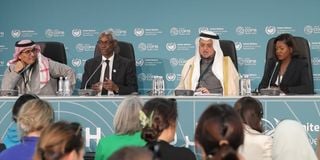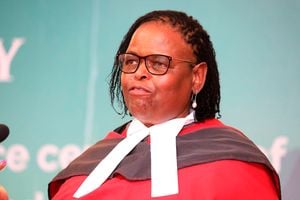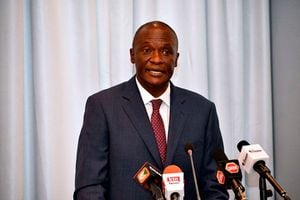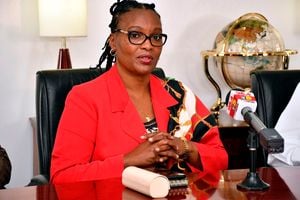COP16: Delegates seek to unlock climate crisis stalemate

Delegates deliberate during at the UN Convention to Combat Desertification (UNCCD) in Riyadh, Saudi Arabia.
In Riyadh, Saudi Arabia
Trust issues? The world's biggest land summit was supposed to end on December 13, 2024 but it hasn't.
The negotiations have stretched into extra time with parties not seeming to agree.
On Friday, with just one day left for before the curtains fall on the world’s biggest land conference (COP16) – the UN Convention to Combat Desertification (UNCCD) – negotiators were yet to agree on the framework the world should adopt to address drought and land degradation issues brought about by the climate crisis.
This has raised serious concerns by negotiators and delegates who expected the Saudi Arabia-led talks to have a draft decision ready and uploaded on UNCCD’s official website as per UN negotiation climate negotiation guidelines.
“Soon as the first draft decision is put together, they ought to have uploaded it on the official website for all members (196 countries, plus the European Union) to see, interrogate, accept or reject while offering insights like it is done in other Conference of Parties (COPs) and even more recently at COP29 in Baku,” a senior negotiator from one of the Small Island States (SIDS) told Nation.Africa on Thursday.
“This is not happening in Riyadh. Instead, the Saudi-led COP Presidency has refused to upload the crucial documents despite us asking they do so leaving most of the delegates in the dark on what exactly is happening, what has been agreed on behind closed doors and what hasn't,” the negotiator said.
The negotiator explained that usually, the concerns and recommendations that come from the first draft of the final decision advice the second draft which is subsequently uploaded again so that by the time the final draft is up all members have reached some sort of consensus on all sticky issues.
This is why delegates from developing countries and SIDS are now concerned that the UNCCD COP16 Presidency wants to jump from ‘negotiation’ entities they are unsure.
This is after officials from the European Union (EU) and US delegations told Nation.Africa exclusively that they are just but ‘mere observers at UNCCD COP16’ to ‘decision’ without input from not only negotiators but also civil society and other stakeholders who may not be in Riyadh but are part of the process as the world is a global village.
“There should be nothing to hide with what is in those documents. Which is why they ought to have already been uploaded on the UNCCD website in their raw form for the world to see. Three weeks ago in Baku, Azerbaijan Saudi Arabia, a major oil producing country that also largely produces polymers for making plastics was accused of 'trying to change wording in the draft text at COP29 to suit her own interests. So should we trust Saudi Arabia with the final decision text no one has seen or knows how they arrived at it?" posed a negotiator from the African Group.
Dr Charles Lange, the Deputy Director for Environmental Planning and Research Coordination at the National Environmental Monitoring Authority (NEMA), said they are alert on what the draft text of the ongoing negotiations should look like.
He said they expect a smooth process, unlike what happened at COP29 about two weeks ago where negotiations stretched past the deadline for two days.
“We want very strong, clear, concise and accurate language in the text,” Dr Lange said, adding that all COP16 negotiations should have ended December 12, 2024 before the concluding plenary.





